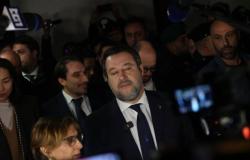ThoseInterview with political scientist about the EU Treaty –
“I’m surprised at how much Switzerland got out of it”
Professor Stefanie Walter gives Switzerland good credit for the negotiations. But she also says that the supporters of a new EU agreement have to turn up the heat in order to have a chance in front of the people.
Published: December 20, 2024, 7:46 p.m
Professor Stefanie Walter describes the negotiations between Switzerland and the EU as being on equal terms.
Photo: Anna-Tia Buss
Subscribe now and benefit from the read-aloud function.
BotTalk
- Professor Stefanie Walter believes that Switzerland negotiated well.
- Switzerland was able to provide clarity when it came to the Union Citizens' Directive and the arbitration tribunal, but failed to do so when it came to controlling immigration and wage protection.
- The termination of negotiations in 2021 helped in retrospect.
- If the supporters of an EU treaty want to win a referendum, they have to change the discourse in the country.
Stefanie Walter is professor of international relations at the University of Zurich. In recent years she has researched the relationship between Switzerland and the EU. One finding: For years, a majority of the population has been in favor of regulated relations with the EU. But Walter also says that advocates need to become more visible if the new agreement should have a chance in front of the people.
Ms. Walter, is the negotiated contract a success?
To be honest, I'm surprised at how much Switzerland got out of it. That's why I think she negotiated well.
What improvements are there compared to the failed framework agreement?
Firstly, the EU Citizens' Directive is now clearly regulated and limited, which was not clear before. Secondly, immigration is strongly linked to work – you are not allowed to come to Switzerland without a job unless you are very rich. Thirdly, criminal foreigners may continue to be deported; this is not possible in the EU states, for example. The super guillotine clause is also gone, and there has also been progress in the area of arbitration. The compensatory measures are limited to the internal market, for example, and must be proportionate. Punishments such as exclusion from the Horizon program no longer exist.
Where did Switzerland lose?
At the EU's red lines. Switzerland would have liked to have a special rule in the posting directive. Compromises had to be made when it came to wage protection and the involvement of the European Court of Justice. In addition, the protective clause is also limited. Switzerland still cannot control immigration completely freely.
Why did the EU stick to the safeguard clause of all things?
The free movement of people is one of the cornerstones of the EU. One should not underestimate how closely the negotiations with Switzerland are being watched within the EU. When Switzerland broke off negotiations in 2021, it didn't take long for the German AfD party to publicly celebrate the “clear signal against Brussels' overreach”. The EU is afraid of such divisive dynamics.
How do you assess the negotiations? One had the impression that the EU was putting pressure on and pushing Switzerland ahead of itself.
I see it a little differently. For the EU, Switzerland is an open deal that needs to be concluded, but it is also not that central. Security issues and dealings with Ukraine, China and the USA are currently much more present in Brussels. In my opinion, the negotiations were diplomatically on an equal footing. But it is also a fact that the larger party with greater market access generally has more weight in international negotiations. This is the EU – and Switzerland certainly felt this.
If you listen to the EU opponents around the SVP, then you should and could negotiate much harder with the EU. Do you share this view?
I ask: How much harder can it be than getting up from the negotiating table? That's what they did with the framework agreement in 2021, and it won't work a second time. But it was a strong signal from Switzerland that we are serious.
So, in retrospect, the demolition was a useful negotiation tactic?
That's how you can see it. International negotiations are, on the one hand, about finding compromises, but also about getting the most out of what is possible. Switzerland has done this successfully. When evaluating the negotiations, you also have to see the other side. In the EU, all member states must agree to such a treaty. Estonia, Croatia, Austria and so on. This is not a given and of course influences the conversations.
What's next?
Now the domestic political process begins. First it is the Federal Council's turn, then Parliament. It must decide how we will vote on it.
Everyone is talking about a referendum, but there is strong domestic political resistance, especially when it comes to wage protection. How likely do you think it is that the thing will crash before then?
I don't think that's happening. The damage to the EU would be enormous. I think the decision will be left to the people.
If there is a referendum: who will win?
In recent years I have conducted several surveys and asked people about the relationship between Switzerland and the EU. There was always a slight majority in favor of an institutional agreement. In direct comparison to all alternatives – termination of bilateral agreements, EU membership or erosion of bilateral agreements – an institutional agreement actually performs significantly better. That doesn't mean the agreement will be accepted, but it definitely has a chance.
Nevertheless, one has the feeling that the supporters are ducking the question of Europe and that one hears above all the opponents.
The discourse is negative, that's true. Positive voices have become rare, both from the parties and from business representatives. This development began after the conclusion of the bilateral agreements, which are massively popular among the population. Things were going well in relations with the EU and there was probably no reason to talk about it. But the opponents continued to speak badly about the EU. This dynamic and the negative discourse has become accentuated.
How can advocates change that?
By talking about the topic. There is hardly any other country in Europe where the EU is as unpopular as in Switzerland. This is also because there is almost no positive discourse about it. When you only hear the negative things about a topic, it changes the way you think. The challenge for supporters is that they have to be able to explain why it is good to change something in order to preserve what is good – the bilateral path. Admittedly, this is not easy.
The morning
The perfect start to the day with news and stories from Switzerland and the world.
More newsletters
Log in
Christian Zuercher is a reporter. He has been working at the Tages-Anzeiger since 2013.More info
Found an error? Report now.
51 comments







